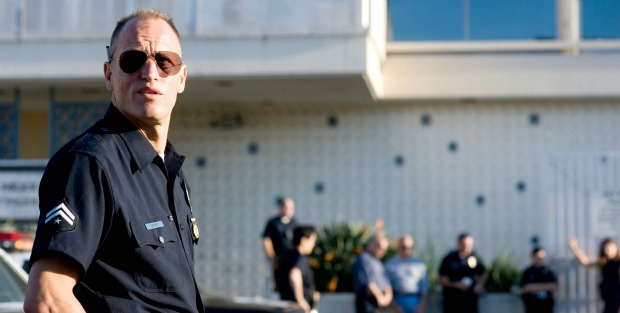Rampart
David Brown, or Date-rape Dave as he’s known in the Rampart division of the force for his as-yet-unproven killing of a serial date-rapist, is Woody Harrelson’s most complex role yet.
Plot summary
Officer Dave Brown is a Vietnam vet and a Rampart Precinct cop, asserting his own code of justice, often blurring the lines between right and wrong to maintain his action-hero state of mind. When he gets caught on tape beating a suspect, he finds himself in a personal and emotional downward spiral as the consequences of his past sins and his refusal to change his ways in light of a department-wide corruption scandal, seal his fate.

Three cops are discussing the ethnic diversity of the city. Mexicans aren’t Ecuadorians, we learn. Good to know. If you wanted a quick and direct message that this film might include a touch of racial inequality – a few unjustified thumps on the head of a few ethnic minorities by the good ol’ LAPD, for example – you’ve got one. Tutoring a rookie driving through the city, Woody Harrelson explains that they’re in a state of ‘emergency law’. It’s a military occupation, he says. Welcome to that famous battle of Los Angeles, 1999.
David Brown, or Date-rape Dave as he’s known in the Rampart division of the force for his as-yet-unproven killing of a serial date-rapist, is Woody Harrelson’s most complex role yet. Father to two daughters, each born from separate mothers (who happen to be sisters) and all living in the same house together, it’s fair to say he’s got an interesting life. He doesn’t eat, but hates to see food wasted. He drinks heavily and sleeps around. When things go bad he uses his influence to score some prescription drugs and takes them and himself to a hotel room with a friendly bottle of scotch. He’s giving Nicolas Cage’s Bad Lieutenant a run for his money. He’s not quite as maniacal, however, you feel his problems stem from something a little more tangible, and reasonable.
When a camera catches him brutally beating someone who crashed into his squad car, his career takes a final tumble towards despair. When it’s coupled with being kicked out of his home by his sister-wives he loses control.
Director Moverman does well to reign in what could be a crazed and hazy trip down Dave’s darkest hours. The character is a loose cannon to say the least, but watching the calamity of this man’s career, even the wider picture of race relationships and abuse in the LAPD that seemed so likely to be a main focal point of the film (Harrelson declares at one point to Ice Cube’s investigator that he hates all people equally), ultimately takes second place to the story of a man cataclysmically losing the trust and love of his daughters.
With a supporting cast that gleams with the likes of Steve Buscemi, Ben Foster, Sigourney Weaver and an excellent, if perhaps stereotypically characterised, daughter in Brie Larson, there isn’t much room for shoddiness. The darker side to the shiny L.A. we’re spoon fed a lot of the time looks rough and raw through the hand-held camera and when you see the likes of crime writer James Ellroy co-writing with Moverman you expect the language to be as tightly woven and non forgiving as it is.
So, like I say, we’ve got a story about a father and his daughters, ultimately, but whereas most other films would let every other aspect fall at the wayside, Rampart is engulfed in the well though out, pseudo political mind-field of 90’s L.A law enforcement and all the problems and bureaucracy that come with it. That combined with Harrelson’s troubled and extremely confident performance means that Rampart is an altogether satisfying watch.
You’ll be asking yourself why you feel sorry for this abusive, obviously racist character, but there’s a look in Harrelson’s eye when his daughters confront him that makes you feel just that. And for that, it’s worth a watch.











COMMENTS